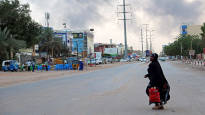The violence in Sudan is about the internal power struggle of the country’s armed forces. The fighting pits the Sudanese army against the paramilitary RSF forces.
The violence in Sudan has already killed 97 civilians and injured 365, says the Sudanese Medical Association.
According to the medical association, the number is probably significantly higher, as it has not been easy to get to hospitals.
Läärikliito’s chapters set up events in hospitals.
According to other estimates, there would already be 1,100 wounded.
The fighting that broke out on Saturday pits the Sudanese army against the paramilitary RSF forces.
Both the army and the RSF claim to control significant areas of the capital, Khartoum.
According to the eyewitness sources of the news agency Reuters, the army seemed to be on the verge of fighting on Sunday.
Blood shortage threatens hospitals
The World Health Organization WHO under the UN has warned of a blood shortage threatening Sudan.
According to the WHO, in Khartoum, the capital of Sudan, hospitals treating several injured civilians have run out of blood, transfusion equipment, intravenous fluids and other vital equipment.
On the other hand, the World Food Program under the UN, WFP, has announced that it will suspend its operations in the North-Eastern African country after three of its employees were killed in the violence.
In the background is a power struggle within the army
The army seized power in Sudan in 2021 and the military council it installed has ruled the country ever since.
At the center of the fighting that has broken out now are two soldiers who both want to lead the Sudanese armed forces and thereby the whole country.
Currently, the commander of the armed forces and practically the president of the country is a general Abdel Fattah al-Burhan.
The country also operates the Rapid Support Forces (RSF), which is about 100,000 strong and is led by General Mohamed Hamdan Dagalo.
These men disagree with the proposed transition to civilian rule.
The RSF was founded in Sudan in 2013 and has its roots in the Janjaweed militia that fought rebels in the Darfur conflict.
